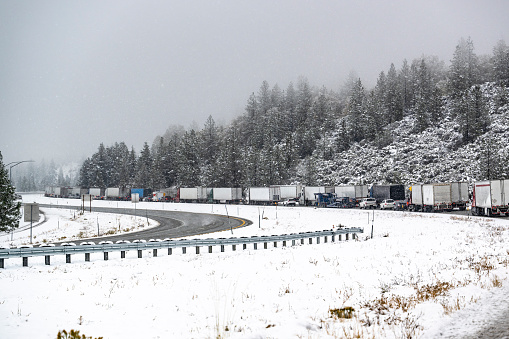Weather intelligence for the future: Crafting a strategic enterprise approach to changing environmental conditions
Continue readingKey takeaways
- Supply chain weather risk is growing due to climate volatility, forcing businesses to rethink logistics and resilience strategies.
- Companies are adopting AI weather models and weather data applications to improve forecasting and reduce costly weather-driven disruptions.
- Weather API integration and severe weather API services provide real-time insights that can help prevent supply chain delays.
Editor’s note: All data sourced from the Weather Means Business report, October 2024, Magid for The Weather Company, unless otherwise noted.
Is your business ready for the new normal of extreme weather? Today’s supply chains face a growing, consistent threat from climate events that are more frequent and severe than ever before. Reacting to a crisis isn’t enough; future-proofing your operations with smart weather intelligence is now a necessity.
increase in weather disruption alerts YoY, according to Resilinc1
New research from The Weather Company’s Weather Means Business report makes it clear that businesses must increasingly incorporate weather data into their business intelligence strategies. Nearly 90% of executives say weather impacts their operations, and 92% plan to increase or maintain their use of weather intelligence. The ability to anticipate and respond to changing weather conditions – both severe and sunny – is no longer just about mitigating risk but creating competitive advantages.
Why businesses are investing in weather intelligence
Weather isn’t just a concern during extreme storms or severe seasonal shifts. Even sunny weather patterns influence supply chains, customer demand, and workforce planning. Businesses that harness weather intelligence can:
- Optimize supply chains by predicting disruptions and improving logistics efficiency.
- Increase revenue by aligning pricing, promotions, and inventory with weather-driven consumer behavior.
- Improve customer experience with more personalized, weather-responsive engagement.
- Reduce financial risk by preparing for weather-related disruptions before they occur.
The data supports this strategic shift. Companies that effectively leverage weather intelligence can achieve revenue increases of 5-10% and substantial reductions in operating costs. Businesses also use AI weather models to improve forecasting accuracy, helping them make faster, data-driven decisions in response to weather risks.
Here are the key ways businesses are leveraging weather data to build a more resilient and profitable future.
Industry-specific applications of weather intelligence
Weather intelligence is transforming industries with data-driven insights. Different industries apply it in various ways, including:
Retail & consumer goods
Retailers and consumer goods companies rely on weather intelligence to plan promotions, manage inventory, and optimize logistics. A sudden drop in temperature can trigger increased demand for winter clothing, while a heatwave can drive higher sales of cold beverages. By leveraging predictive weather data, companies can prepare for these shifts in advance, ensuring they have the right products available at the right time.
Many companies are now integrating weather data applications into their supply chain management and marketing strategies. These tools help businesses predict demand fluctuations, track product shipments, and minimize supply chain disruptions caused by severe weather.
Pharmaceutical & healthcare
 In the pharmaceutical industry, weather influences everything from manufacturing to distribution and patient care. Temperature-sensitive medications must be transported and stored under strict conditions, and extreme weather events can delay shipments. Hospitals and healthcare providers also need weather intelligence to manage staffing, patient transportation, and emergency preparedness.
In the pharmaceutical industry, weather influences everything from manufacturing to distribution and patient care. Temperature-sensitive medications must be transported and stored under strict conditions, and extreme weather events can delay shipments. Hospitals and healthcare providers also need weather intelligence to manage staffing, patient transportation, and emergency preparedness.
As supply chain weather risks increase due to climate volatility, pharmaceutical companies are prioritizing predictive analytics to avoid disruptions and ensure the timely delivery of essential medicines.
Insurance & risk management
Insurance companies are adapting to rising climate-related risks by integrating weather intelligence into their underwriting, claims processing, and policy pricing. Real-time weather analytics can help insurers anticipate severe weather events, proactively communicate with policyholders, and speed up claims resolution. Using historical and predictive weather data, insurance providers can refine risk models and offer more competitive pricing.
Travel & tourism
 Weather conditions heavily influence the travel and tourism industry. Airlines, hotels, and travel agencies use weather intelligence to adjust schedules, reroute flights, and strengthen safety protocols. Delays due to storms or extreme heat can lead to costly disruptions. But companies anticipating these conditions can manage bookings more effectively and improve customer satisfaction.
Weather conditions heavily influence the travel and tourism industry. Airlines, hotels, and travel agencies use weather intelligence to adjust schedules, reroute flights, and strengthen safety protocols. Delays due to storms or extreme heat can lead to costly disruptions. But companies anticipating these conditions can manage bookings more effectively and improve customer satisfaction.
Businesses in this sector also rely on weather intelligence to prepare for seasonal weather disruptions. By analyzing long-term climate trends, travel companies can adjust pricing, optimize staffing levels, and create promotional offers tailored to weather patterns in key travel destinations.
The Weather Company APIs: your strategic advantage
The business case for weather intelligence is clear, but how do you turn insight into action? The answer lies in leveraging the right tools. The Weather Company’s weather data APIs provide the powerful, comprehensive, and accurate weather data needed to operationalize weather intelligence across your business.
Our APIs are designed for seamless weather API integration, allowing you to embed real-time, historical, and forecast data directly into your existing supply chain management, logistics, and enterprise resource planning systems. This allows for:
- Proactive planning: Use our suite of forecast APIs to anticipate disruptions weeks or even months in advance. Our AI-driven models, including the Global High-Resolution Atmospheric Forecasting (GRAF) model, deliver unparalleled accuracy and resolution, helping you optimize inventory and logistics before a weather event.
- Real-time decision-making: With our Current Conditions, Severe Weather APIs, and Alerts APIs, you can get instant updates on severe weather and other impactful conditions. Real-time insights can help you adjust shipping routes, reroute fleets around hazardous conditions, and protect both assets and workforce safety.
- Data-driven optimization: Access decades of historical weather data through our APIs to analyze past trends, refine risk models, and inform long-term strategic decisions. A rich dataset like this helps you better understand the connection between weather and operational performance.
By integrating The Weather Company APIs, you can move beyond reactive measures and build a truly resilient, data-driven supply chain.
The business case for weather intelligence
Companies that fail to integrate weather intelligence into their strategies often operate reactively, responding to disruptions as they happen rather than preparing for them in advance. Such an approach leads to financial losses, inefficiencies, and missed opportunities.
By contrast, companies that embrace AI-driven weather insights can:
- Reduce operating costs by optimizing supply chain routes, avoiding delays, and minimizing waste.
- Enhance marketing effectiveness by aligning campaigns with weather-driven consumer behavior.
- Improve safety and compliance by making sure employees, assets, and operations are protected against weather risks.
The next step: Turning weather data into a business strategy
Executives who integrate weather insights into their business models are better positioned to drive growth, manage risk, and improve customer experiences. The latest research from The Weather Company breaks down how businesses across industries are using weather intelligence to gain a competitive advantage.
Download the full report today to explore real-world applications, industry-specific insights, and actionable strategies for integrating weather intelligence into your business.
Let's talk
Contact our experts today to discover how Weather Data APIs can empower your decision-making and strengthen your business resilience. Let us help you transform weather data into a strategic asset.
Contact us1 Resilinc, Global Supply Chains See Nearly 40% Increase in Disruptions, January 21, 2025

